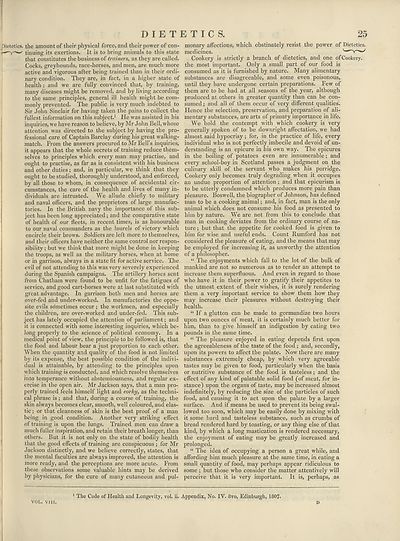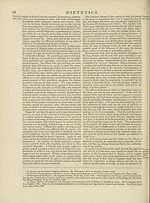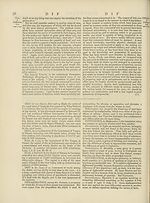Encyclopaedia Britannica > Volume 8, DIA-England
(35) Page 25
Download files
Complete book:
Individual page:
Thumbnail gallery: Grid view | List view

pietetics.
t-nrw
DIETETICS.
25
the amount of their physical force, and their power of con¬
tinuing its exertions. It is to bring animals to this state
that constitutes the business of trainers, as they are called.
Cocks, greyhounds, race-horses, and men, are much more
active and vigorous after being trained than in their ordi¬
nary condition. They are, in fact, in a higher state of
health ; and we are fully convinced that, by training,
many diseases might be removed, and by living according
to the same principles, general ill health might be com¬
monly prevented. The public is very much indebted to
Sir John Sinclair for having taken the pains to collect the
fullest information on this subject.1 He was assisted in his
inquiries, we have reason to believe, by Mr John Bell, whose
attention was directed to the subject by having the pro¬
fessional care of Captain Barclay during his great walking-
match. From the answers procured to Mr Bell’s inquiries,
it appears that the whole secrets of training reduce them¬
selves to principles which every man may practise, and
ought to practise, as far as is consistent with his business
and other duties; and, in particular, we think that they
ought to be studied, thoroughly understood, and enforced,
by all those to whom, in consequence of accidental cir¬
cumstances, the care of the health and lives of many in¬
dividuals are intrusted. We allude chiefly to military
and naval officers, and the proprietors of large manufac¬
tories. In the British navy the importance of this sub¬
ject has been long appreciated; and the comparative state
of health of our fleets, in recent times, is as honourable
to our naval commanders as the laurels of victory which
encircle their brows. Soldiers are left more to themselves,
and their officers have neither the same control nor respon¬
sibility; but we think that more might be done in keeping
the troops, as well as the military horses, when at home
or in garrison, always in a state fit for active service. The
evil of not attending to this was very severely experienced
during the Spanish campaigns. The artillery horses sent
from Chatham were found to be unfit for the fatigues of
service, and good cart-horses were at last substituted with
great advantage. In garrison both men and horses are
over-fed and under-worked. In manufactories the oppo¬
site evils sdmetimes occur; the workmen, and especially
the children, are over-worked and under-fed. This sub¬
ject has lately occupied the attention of parliament; and
it is connected with some interesting inquiries, which be¬
long properly to the science of political economy. In a
medical point of view, the principle to be followed is, that
the food and labour bear a just proportion to each other.
When the quantity and quality of the food is not limited
by its expense, the best possible condition of the indivi¬
dual is attainable, by attending to the principles upon
which training is conducted, and which resolve themselves
into temperance without abstemiousness, and regular ex¬
ercise in the open air. Mr Jackson says, that a man pro¬
perly trained feels himself light and corky, as the techni¬
cal phrase is; and that, during a course of training, the
skin always becomes clear, smooth, well coloured, and elas¬
tic ; or that cleanness of skin is the best proof of a man
being in good condition. Another very striking effect
of training is upon the lungs. Trained men can draw a
much fuller inspiration, and retain their breath longer, than
others. But it is not only on the state of bodily health
that the good effects of training are conspicuous ; for Mr
Jackson distinctly, and we believe correctly, states, that
the mental faculties are always improved, the attention is
more ready, and the perceptions are more acute. From
these observations some valuable hints may be derived
by physicians, for the cure of many cutaneous and pul¬
monary affections, which obstinately resist the power of Dietetics,
medicines.
Cookery is strictly a branch of dietetics, and one ofCookery.
the most important. Only a small part of our food is
consumed as it is furnished by nature. Many alimentary
substances are disagreeable, and some even poisonous,
until they have undergone certain preparations. Few of
them are to be had at all seasons of the year, although
produced at others in greater quantity than can be con¬
sumed ; and all of them occur of very different qualities.
Flence the selection, preservation, and preparation of ali¬
mentary substances, are arts of primary importance in life.
We hold the contempt with which cookery is very
generally spoken of to be downright affectation, we had
almost said hypocrisy; for, in the practice of life, every
individual who is not perfectly imbecile and devoid of un¬
derstanding is an epicure in his own way. The epicures
in the boiling of potatoes even are innumerable; and
every school-boy in Scotland passes a judgment on the
culinary skill of the servant who makes his porridge.
Cookery only becomes truly degrading when it occupies
an undue proportion of attention ; and that epicurism is
to be utterly condemned which produces more pain than
pleasure. Boswell, the biographer of Johnson, has defined
man to be a cooking animal; and, in fact, man is the only
animal which does not consume his food as presented to
him by nature. We are not from this to conclude that
man in cooking deviates from the ordinary course of na¬
ture ; but that the appetite for cooked food is given to
him for wise and useful ends. Count Rumford has not
considered the pleasure of eating, and the means that may
be employed for increasing it, as unworthy the attention
of a philosopher.
“ The enjoyments which fall to the lot of the bulk of
mankind are not so numerous as to render an attempt to
increase them superfluous. And even in regard to those
who have it in their power to gratify their appetites to
the utmost extent of their wishes, it is surely rendering
them a very important service to show them how they
may increase their pleasures without destroying their
health.
“ If a glutton can be made to gormandize two hours
upon two ounces of meat, it is certainly much better for
him, than to give himself an indigestion by eating two
pounds in the same time.
“ The pleasure enjoyed in eating depends first upon
the agreeableness of the taste of the food; and, secondly,
upon its powers to affect the palate. Now there are many
substances extremely cheap, by which very agreeable
tastes may be given to food, particularly when the basis
or nutritive substance of the food is tasteless; and the
effect of any kind of palatable solid food (of meat, for in¬
stance) upon the organs of taste, may be increased almost
indefinitely, by reducing the size of the particles of such
food, and causing it to act upon the palate by a larger
surface. And if means be used to prevent its being swal¬
lowed too soon, which may be easily done by mixing with
it some hard and tasteless substance, such as crumbs of
bread rendered hard by toasting, or any thing else of that
kind, by which a long mastication is rendered necessary,
the enjoyment of eating may be greatly increased and
prolonged.
“ The idea of occupying a person a great wffiile, and
affording him much pleasure at the same time, in eating a
small quantity of food, may perhaps appear ridiculous to
some ; but those who consider the matter attentively will
perceive that it is very important. It is, perhaps, as
VOL. VIII.
1 The Code of Health and Longevity, vol. ii. Appendix, No. IV. 8vo, Edinburgh, 1807-
D
t-nrw
DIETETICS.
25
the amount of their physical force, and their power of con¬
tinuing its exertions. It is to bring animals to this state
that constitutes the business of trainers, as they are called.
Cocks, greyhounds, race-horses, and men, are much more
active and vigorous after being trained than in their ordi¬
nary condition. They are, in fact, in a higher state of
health ; and we are fully convinced that, by training,
many diseases might be removed, and by living according
to the same principles, general ill health might be com¬
monly prevented. The public is very much indebted to
Sir John Sinclair for having taken the pains to collect the
fullest information on this subject.1 He was assisted in his
inquiries, we have reason to believe, by Mr John Bell, whose
attention was directed to the subject by having the pro¬
fessional care of Captain Barclay during his great walking-
match. From the answers procured to Mr Bell’s inquiries,
it appears that the whole secrets of training reduce them¬
selves to principles which every man may practise, and
ought to practise, as far as is consistent with his business
and other duties; and, in particular, we think that they
ought to be studied, thoroughly understood, and enforced,
by all those to whom, in consequence of accidental cir¬
cumstances, the care of the health and lives of many in¬
dividuals are intrusted. We allude chiefly to military
and naval officers, and the proprietors of large manufac¬
tories. In the British navy the importance of this sub¬
ject has been long appreciated; and the comparative state
of health of our fleets, in recent times, is as honourable
to our naval commanders as the laurels of victory which
encircle their brows. Soldiers are left more to themselves,
and their officers have neither the same control nor respon¬
sibility; but we think that more might be done in keeping
the troops, as well as the military horses, when at home
or in garrison, always in a state fit for active service. The
evil of not attending to this was very severely experienced
during the Spanish campaigns. The artillery horses sent
from Chatham were found to be unfit for the fatigues of
service, and good cart-horses were at last substituted with
great advantage. In garrison both men and horses are
over-fed and under-worked. In manufactories the oppo¬
site evils sdmetimes occur; the workmen, and especially
the children, are over-worked and under-fed. This sub¬
ject has lately occupied the attention of parliament; and
it is connected with some interesting inquiries, which be¬
long properly to the science of political economy. In a
medical point of view, the principle to be followed is, that
the food and labour bear a just proportion to each other.
When the quantity and quality of the food is not limited
by its expense, the best possible condition of the indivi¬
dual is attainable, by attending to the principles upon
which training is conducted, and which resolve themselves
into temperance without abstemiousness, and regular ex¬
ercise in the open air. Mr Jackson says, that a man pro¬
perly trained feels himself light and corky, as the techni¬
cal phrase is; and that, during a course of training, the
skin always becomes clear, smooth, well coloured, and elas¬
tic ; or that cleanness of skin is the best proof of a man
being in good condition. Another very striking effect
of training is upon the lungs. Trained men can draw a
much fuller inspiration, and retain their breath longer, than
others. But it is not only on the state of bodily health
that the good effects of training are conspicuous ; for Mr
Jackson distinctly, and we believe correctly, states, that
the mental faculties are always improved, the attention is
more ready, and the perceptions are more acute. From
these observations some valuable hints may be derived
by physicians, for the cure of many cutaneous and pul¬
monary affections, which obstinately resist the power of Dietetics,
medicines.
Cookery is strictly a branch of dietetics, and one ofCookery.
the most important. Only a small part of our food is
consumed as it is furnished by nature. Many alimentary
substances are disagreeable, and some even poisonous,
until they have undergone certain preparations. Few of
them are to be had at all seasons of the year, although
produced at others in greater quantity than can be con¬
sumed ; and all of them occur of very different qualities.
Flence the selection, preservation, and preparation of ali¬
mentary substances, are arts of primary importance in life.
We hold the contempt with which cookery is very
generally spoken of to be downright affectation, we had
almost said hypocrisy; for, in the practice of life, every
individual who is not perfectly imbecile and devoid of un¬
derstanding is an epicure in his own way. The epicures
in the boiling of potatoes even are innumerable; and
every school-boy in Scotland passes a judgment on the
culinary skill of the servant who makes his porridge.
Cookery only becomes truly degrading when it occupies
an undue proportion of attention ; and that epicurism is
to be utterly condemned which produces more pain than
pleasure. Boswell, the biographer of Johnson, has defined
man to be a cooking animal; and, in fact, man is the only
animal which does not consume his food as presented to
him by nature. We are not from this to conclude that
man in cooking deviates from the ordinary course of na¬
ture ; but that the appetite for cooked food is given to
him for wise and useful ends. Count Rumford has not
considered the pleasure of eating, and the means that may
be employed for increasing it, as unworthy the attention
of a philosopher.
“ The enjoyments which fall to the lot of the bulk of
mankind are not so numerous as to render an attempt to
increase them superfluous. And even in regard to those
who have it in their power to gratify their appetites to
the utmost extent of their wishes, it is surely rendering
them a very important service to show them how they
may increase their pleasures without destroying their
health.
“ If a glutton can be made to gormandize two hours
upon two ounces of meat, it is certainly much better for
him, than to give himself an indigestion by eating two
pounds in the same time.
“ The pleasure enjoyed in eating depends first upon
the agreeableness of the taste of the food; and, secondly,
upon its powers to affect the palate. Now there are many
substances extremely cheap, by which very agreeable
tastes may be given to food, particularly when the basis
or nutritive substance of the food is tasteless; and the
effect of any kind of palatable solid food (of meat, for in¬
stance) upon the organs of taste, may be increased almost
indefinitely, by reducing the size of the particles of such
food, and causing it to act upon the palate by a larger
surface. And if means be used to prevent its being swal¬
lowed too soon, which may be easily done by mixing with
it some hard and tasteless substance, such as crumbs of
bread rendered hard by toasting, or any thing else of that
kind, by which a long mastication is rendered necessary,
the enjoyment of eating may be greatly increased and
prolonged.
“ The idea of occupying a person a great wffiile, and
affording him much pleasure at the same time, in eating a
small quantity of food, may perhaps appear ridiculous to
some ; but those who consider the matter attentively will
perceive that it is very important. It is, perhaps, as
VOL. VIII.
1 The Code of Health and Longevity, vol. ii. Appendix, No. IV. 8vo, Edinburgh, 1807-
D
Set display mode to:
![]() Universal Viewer |
Universal Viewer | ![]() Mirador |
Large image | Transcription
Mirador |
Large image | Transcription
Images and transcriptions on this page, including medium image downloads, may be used under the Creative Commons Attribution 4.0 International Licence unless otherwise stated. ![]()
| Encyclopaedia Britannica > Encyclopaedia Britannica > Volume 8, DIA-England > (35) Page 25 |
|---|
| Permanent URL | https://digital.nls.uk/193323460 |
|---|
| Attribution and copyright: |
|
|---|
| Description | Ten editions of 'Encyclopaedia Britannica', issued from 1768-1903, in 231 volumes. Originally issued in 100 weekly parts (3 volumes) between 1768 and 1771 by publishers: Colin Macfarquhar and Andrew Bell (Edinburgh); editor: William Smellie: engraver: Andrew Bell. Expanded editions in the 19th century featured more volumes and contributions from leading experts in their fields. Managed and published in Edinburgh up to the 9th edition (25 volumes, from 1875-1889); the 10th edition (1902-1903) re-issued the 9th edition, with 11 supplementary volumes. |
|---|---|
| Additional NLS resources: |
|

